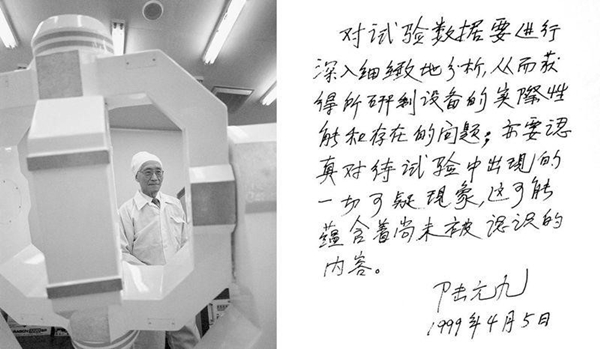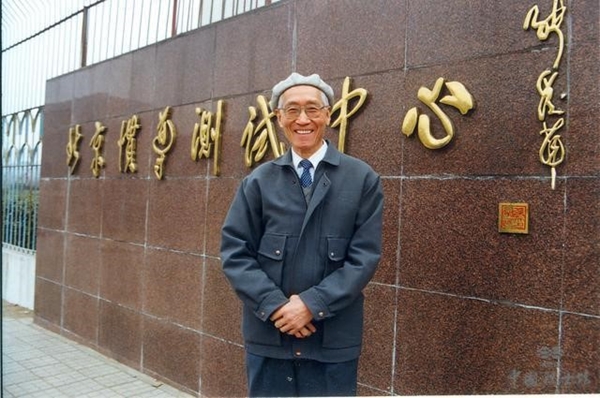Lu Yuanjiu: 100-point is only the pass mark
Is 99 points an excellent score?
For most people, a 99-point score should be considered a very good result. But for Lu Yuanjiu and others in the spaceflight industry, there is only one result — fail!
"Products for the spaceflight industry, 99 points means failure, which is equivalent to 0 points. And 100 points is the pass mark, and if the product passes the examination, it should also be subject to further evaluation," Lu remarked.
In 1996, the launch of the Long March-3B rocket failed, and the reason was unknown. As the person in charge of the inertial devices used in the rocket, 76-year-old Lu rushed to Xichang. In the following several months, he conducted painstaking investigation and analysis, ultimately finding a small clue among thousands: a bidirectional triode thyristor, which was key to the problem. The following year, the Long March-3B rocket was successfully launched.
This saying has since become well-known and is widely circulated in China's aerospace industry to this day.
Lu has a profound understanding of the special nature of aerospace work and the extremely high requirements for quality and safety it entails. He particularly stressed that scientific research personnel must maintain a scientific and rigorous attitude. He proposed that every theoretical analysis, every design document, every test, and every piece of data in their work should be taken seriously, with no room for the slightest omission or negligence. Lu said that as scientific and technological personnel, one should adhere to specific requirements: diligence in study, prowess in thinking, adeptness in analysis, strictness, earnestness, and persistence.

Photo taken at the Beijing Inertial Navigation Test Center at the Second Academy of China Aerospace Corporation on March 31, 1999. [Photo/mmcs.org.cn]
The world's first Ph.D. in the field of inertial navigation
In the mid-1940s, Lu, holding the belief of "learning science to save China", crossed the ocean to study in the Department of Aeronautics and Astronautics at the Massachusetts Institute of Technology in the United States. "Since I came to study abroad, I must learn new things," he decided and chose to major in instrumentation, studying the "inertial navigation" technology that few people had heard of at that time.
He did not choose the engine-related major that he was familiar with; instead, he decided to study the more challenging field of instrumentation under Professor Charles Stark Draper, a renowned expert in automatic control and known as the "father of inertial navigation". The major required Lu to learn new courses and pass exams before completing his thesis, which daunted many. In the end, there were only two students: Lu and another Chinese student.
Lu cherished the hard-won opportunity to study abroad. He rarely went anywhere except his dormitory and school. Thanks to his hard work and solid research skills, Lu became the world's first doctor in the field of inertial navigation in 1949. At the age of 29, he was hired as a research associate at the Massachusetts Institute of Technology.

Lu Yuanjiu in front of the gate of the Beijing Inertial Navigation Test Center, taken on March 31, 1999. [Photo/China Aerospace Science and Technology Corporation]
Proposing the concept of "recycling satellites" in the world for the first time
Soon after returning to China, Lu was assigned to the Chinese Academy of Sciences to participate in the preparation for the establishment of the Institute of Automation. It can be said that he started from scratch. The conditions were poor, and there was no original data for the research design. He personally engaged in the whole process from the preparation of office space to the purchase of test equipment to the formation of the research team. However, Lu said frankly: "Our motherland is always my true love. Working in my own country, no matter how hard the situation is and how tired I am, I am very happy." His endeavors contributed to the realization of China's magnificent dream of spaceflight, launching rockets and man-made satellites, exploring the moon, and setting foot on Mars.
In 1958, (then Chinese chairman) Mao Zedong stated: "We too should produce man-made satellites." The mission of the Institute of Automation of the Chinese Academy of Sciences shifted from the original industrial automation to sounding rockets and satellites. Lu made a bold proposal to conduct research into automated control and the recycling of man-made satellites. This was the first time in the world that the concept of "recycling satellites" had been proposed. After more than two months of experimental research, in October 1958, Lu and his colleagues developed a structural diagram of a carrier rocket and a model of China's first sounding rocket instrument compartment.
Since then, Lu had continued to develop in the fields of gyroscope and inertial navigation technology and had made outstanding contributions to the development of China's inertial technology and its application in carrier rockets, missile weapons, man-made satellites, and manned spacecraft. He also contributed his wisdom to the planning and demonstration of major national scientific and technological projects represented by manned spaceflight and lunar exploration projects.
On the occasion of the centenary of the founding of the Communist Party of China, Lu was awarded the July 1 Medal, the Party's highest honor, on July 1, 2021. About half a month earlier, the Shenzhou-12 manned spacecraft had sent three astronauts, Nie Haisheng, Liu Boming, and Tang Hongbo, into space, marking the first manned mission during the Chinese space station stage. Lu regarded this medal as an honor for all aerospace workers.








